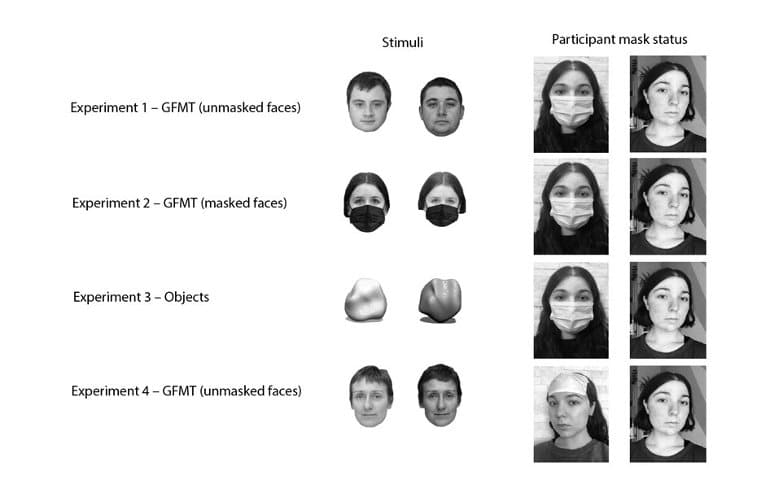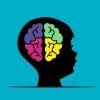Summary: When you’re sporting a face masks, it could be tougher so that you can acknowledge folks, even when they aren’t sporting masks.
Source: York University
Recognizing somebody could also be tougher when you’re sporting a face masks—even when the individual you’re looking at is maskless, in line with new analysis from York University.
Previous analysis confirmed that adults and youngsters have issue recognizing faces when a part of their face is obscured by a masks, comparable to these worn through the COVID-19 pandemic, and that doesn’t get higher with time.
This new collection of experiments performed at York sheds gentle on how face notion skills are disrupted for the individual sporting a masks, no matter whether or not the individual they’re taking a look at is masked or unmasked.
So as new omicron subvariants begin circulating and other people attain for his or her masks, researchers say they shouldn’t be embarrassed if they begin having extra issue recognizing mates and colleagues once more.
“We wanted to investigate the effect of wearing a mask on face perception—something that hasn’t been explored before as far as we know—to see how the perception abilities of a masked observer changes in relation to others,” says Assistant Professor Erez Freud of York’s Faculty of Health, who co-authored the research with York undergraduate college students Daniela Di Giammarino and Carmel Camilleri.
As a part of the research, there have been 4 totally different experiments involving 80 contributors for every who have been proven non-masked and masked faces whereas they themselves both had a masks on or off.
The outcomes have been shocking. Wearing a masks impacts the power to acknowledge the faces of others. The essential issue was not whether or not the introduced face had a masks on or not, it was whether or not the participant had their masks on or off that made the distinction.
Freud says one clarification might be that when folks put on a masks, they typically assume others can’t acknowledge them. “Masked observers might think their own faces are less recognizable and that could lead to reduced face processing abilities. This might have to do with how people view things from other people’s perspectives, a process called alter centric intrusion.”
Another purpose, he says, may must do with the fixed tactile stimulation to the decrease a part of the masks wearer’s face, making a reminder that individuals can’t see that a part of their face, and it could trigger them to have issue perceiving that a part of others.
The impact, nonetheless, solely labored when sporting a masks within the typical method—masking the nostril and mouth.

“We also found that the effect of mask wearing on face perception is specific to situations only in which you wear the mask on the distinctive features of the face, such as your nose and mouth,” says Freud.
“When we asked study participants to wear the face mask on their forehead, we did not find any effect of mask wearing on face perception ability.”
In addition, the impact solely occurs with faces, not objects. When contributors have been requested to acknowledge issues like an orange, their recognition skill was not affected by sporting a masks.
“I was a bit surprised by the results of this study,” says Freud. “I didn’t think we would find such a robust effect of mask-wearing on face perception abilities, but I guess this is one of the reasons for which we do science.”
About this facial recognition analysis information
Author: Press Office
Source: York University
Contact: Press Office – York University
Image: The picture is credited to York University
Original Research: Open entry.
“Mask-wearing selectivity alters observers’ face perception” by Erez Freud et al. Cognitive Research: Principles and Investigations
Abstract
Mask-wearing selectivity alters observers’ face notion
Face masks grew to become prevalent throughout the globe as an environment friendly software to cease the unfold of COVID-19. A number of research already demonstrated that masks result in adjustments in facial identification and emotional expression processing.
These adjustments have been documented throughout ages and have been constant even with the elevated publicity to masked faces. Notably, mask-wearing additionally adjustments the state of the observers in regard to their very own our bodies and different brokers.
Previous analysis has already demonstrated a believable affiliation between observers’ states and their perceptual behaviors. Thus, an excellent query is whether or not mask-wearing would alter face recognition skills.
To handle this query, we performed a set of experiments during which contributors have been requested to acknowledge non-masked faces (Experiment 1), masked faces (Experiment 2) and novel objects (Experiment 3) whereas they have been both masked or unmasked.
Mask sporting hindered face notion skills however didn’t modulate object recognition skill. Finally, we demonstrated that the decrement in face notion skill relied on sporting the masks on distinctive facial options (Experiment 4). Together, these findings reveal a novel impact of mask-wearing on face recognition.
We focus on these outcomes contemplating the believable impact of somatosensory stimulation on visible processing in addition to the impact of involuntary perspective taking.














Discussion about this post